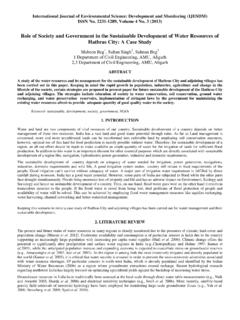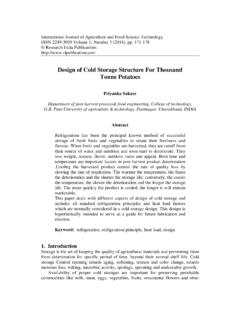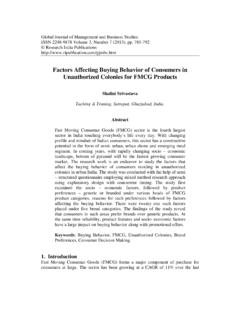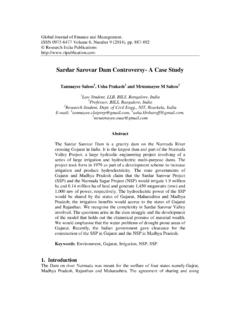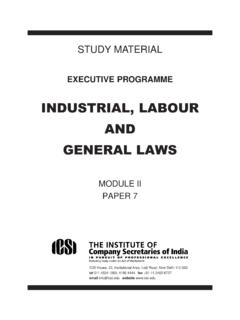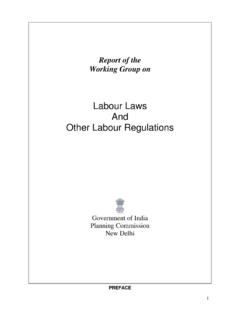Transcription of Hiring and Firing in India - Research India …
1 Global Journal of Finance and Management. ISSN 0975-6477 Volume 6, Number 6 (2014), pp. 523-528 Research India Publications Hiring and Firing in India Jyoti Vishwakarma 24- Pritam Road Dalanwala Dehradun, Uttarakhand 248001 Abstract Indian Labor and Employment Law is among one of the most complex in the world and therefore employers in India have to exercise great caution while Hiring and managing employees. As any firm hire, it is mandatory to conform to various central and state regulations that ensure employees are well protected and has access to various.
2 There are regulations that one need to conform when any firm could hire such contracted labor. Workers are more aware of their rights under the law and they re more likely to seek the advice of an attorney if they think they ve been wronged by their employer. As a result: Many workers are getting even by suing their employers for wrongful discharge or discrimination. This paper reviews the legal prospective regarding the Hiring and Firing aspects in firms according to different laws in India .
3 Keywords: Employee Hiring , Employee Firing , Employee termination. 1. Introduction According to Indian labour and Employment laws there are three main categories of employees: government employees, employees in government controlled corporate bodies known as Public Sector Undertakings (PSUs) and private sector employees. The rules and regulations governing the employment of government employees are covered under the Constitution of India . Accordingly, government employees enjoy protection of tenure, statutory service contentions and automatic annually salary increases.
4 Public sector employees are governed by their own service regulations, which either have statutory force, in the case of statutory corporations, or are based on statutory orders. In the private sector, employees can be classified into two broad categories namely management staff and workman. There is no statutory provisions relating to their employment and accordingly in case of managerial and supervisory staff/employee the conditions of employment are governed by respective contracts of Jyoti Vishwakarma 524employment and their services can be discharged in terms of their contract of employment.
5 [1,2] Many employees don t know what are their rights and what the Indian laws says to protect their rights, it s very important to know the rights as an employees in any firm, people join firms but they are unaware of the laws related to their Hiring and Firing , due to which many employers exploit there employees, in government sector such cases are less but in privet sector they are many, this paper focuses on the laws in India which were formulated to protect employees from illegal Firing and other legal aspects related to Hiring and Firing of employees.
6 While Hiring employee whether on full time bases/directly Hiring , or on permanent or fixed term basis or on temporary period all the laws potentially be applicable. Till now there are no specific laws in India , which could provide procedure or manner for Hiring employees in private sector. Organizations hire employees on permanent basis or contract basis, the employee could be hired through newspaper advertisements, recruitment firms, online job portals, personal networks.
7 A permanent worker can be terminated only for proven misconduct of for habitual absence from work. The terms of the employment, either on contract basis or permanent employee basis, would be governed by the contract between the organisation and the employee. However, the Local Shops and Establishments Act also plays an important role for such provisions.[3] 2. labour laws According to labour laws in India certain conditions were laid down for legal termination of any worker/ employee, which firms should follow, other than these the termination would be treated as illegal in law.
8 Following are the laws which are related to termination of employee/ worker in different sectors. non-workman in Private Sector [4] Primarily, none of the labour laws apply to non-workmen and service conditions of such employees they are governed by the respective contracts and general service conditions (if existing). In case of termination, courts cannot reinstate the Employee. Employee only has recourse for damages. Courts in India are conservative in awarding damages and punitive damages are rarely awarded.
9 When Termination of Employment is Illegal in Law [4] Workmen get protected under various legislations in India . Under section 9A of IDA it becomes difficult to vary the terms and conditions of the workman. It will be illegal to retrench and lay off if statutory conditions are not fulfilled and prescribed compensation is not paid to the workmen. In certain cases Appropriate Government s prior permission is also required. Hiring and Firing in India 525 Termination of employees not workmen will be governed by the terms of their appointment letter / employment contract and follows, any termination not as per their contract may be construed to be illegal.
10 Lay-Off and Retrenchment of Workman in Private Sector [4] Section 2 (kkk) defines lay-off the failure of the employer to provide employment due to shortage of raw material, power etc. but who has not been retrenched. Section 2 (oo) defines retrenchment as termination of a workman for any reason whatsoever otherwise than voluntary retirement, reaching age of superannuation, non renewal of contract or termination due to continued ill-health.

